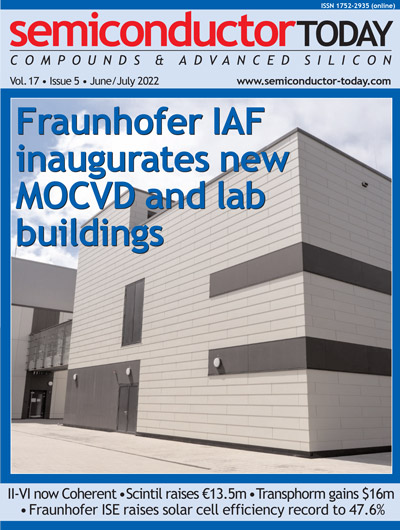- News
16 August 2013
POET endorses Special Strategic Committee’s recommendations for next phase of commercialization
POET Technologies Inc of Toronto, Ontario, Canada – which, through subsidiary OPEL Defense Integrated Systems (ODIS Inc) of Storrs, CT, USA, has developed the proprietary planar-optoelectronic technology (POET) platform for monolithic fabrication of integrated III-V-based electronic and optical devices on a single semiconductor wafer – says that its board of directors has endorsed the next phases of the company’s commercialization plan put forward by the Special Strategic Committee (SSC), which was established in June and is chaired by executive director Peter Copetti.
The multi-pronged approach is based on discussions with potential industry partners and advisers regarding the company’s two key markets, consisting of the military and commercial sectors, that have been identified as potential early adopters of the POET platform. The firm says that currently, while POET’s incorporation in military projects is proceeding well and should provide value in several key verticals, significant value exists in adapting POET for mass production within a commercial semiconductor fab environment. The company recognizes that it must rapidly move to the next phase of its commercialization plan, which includes addressing feature size and scalability requirements for commercial fabs.
The board has therefore endorsed, and authorized the SSC to proceed on, the following recommendations:
- Establishing a POET Development Alliance (PDA) - The firm aims to establish relationships with one or more industrial partners looking towards jointly adapting POET to commercial-scale III-V implementation. Alliance partners will provide key input including intellectual assets, technical staff, manufacturing capability, and foundry resources. In addition to optimizing device parameters and yields, a near-term goal will be to establish comprehensive design rules and a device parameter library for POET, proliferating licensed designs in a POET device ecosystem.
- Drive for reduction of feature size to 100nm range (100NM) - The firm will re-prioritize its technical roadmap by introducing specific milestones associated with reducing feature size from the sub-micron to the 100nm range in scale, targeting fourth-quarter 2013 for that milestone. Consequently, the milestone for full optoelectronic integration on a single die will be re-scheduled to Q2/2014. Even without this full integration milestone, the 100nm goal anticipates the cadence of commercial III-V foundry capabilities. This roadmap will focus the firm’s ODIS subsidiary on developmental work that will allow for scalable production within existing commercial fabs.
- Adoption of a Shareholder Rights Plan (SRP) - The firm will be structuring a special SRP to protect the potential value of the company, for all shareholders, during the period where discussions with potential partners may be taking place regarding PDA-related agreements, and as progress on the 100NM project continues. “This move crystallizes the company’s strategy for unlocking the value of our intellectual property,” says Copetti. “A development alliance with the right partners will definitely shorten time-to-market, and help evolve a design ecosystem for POET in the marketplace.”
Further SSC actions will be endorsed by the board depending on the status of the above initiatives.
“While the new feature-size milestone is a challenge given our commitment to projects in our delivery pipeline, I believe the POET team is more than capable of achieving this goal,” comments Copetti. “There is no doubt that POET can demonstrate its n- and p-channel capability to be a viable and scalable complement to silicon CMOS,” he reckons.
The POET platform has demonstrated monolithic fabrication of integrated circuit gallium arsenide (GaAs) based devices containing both electronic and optical elements on a single wafer. The firm reckons that, by offering components with the potential for increased speed, density, reliability and lower costs, it offers the semiconductor industry the ability to push Moore’s Law to the next level, overcoming current silicon-based bottlenecks and potentially changing the roadmap for a broad range of applications.
The POET platform is currently the basis for a number of key projects, including optical code division multiple access (OCDMA) devices for avionics systems, combined RF/optical phased arrays, optoelectronic directional couplers, and ultra-low-power random access memory (RAM).
POET grants incentive stock options
POET has granted additional incentive stock options under its stock option plan, to certain directors, officers, key consultants and employees, to purchase up to an aggregate of 3,280,000 common shares of the firm, representing 2.47% of its outstanding shares.
Of these options, 14.6% were granted to key employees (technical staff related to the POET effort), 19.8% to the company’s officers, 64% to the non-officer members of the board of directors and 1.5% to consultants. The stock options are exercisable at a price of CA$0.49 per share expiring 13 August 2018. Pursuant to the policies of Canada’s TSX Venture Exchange, the exercise price was fixed by the closing market price of 12 August. The options will vest and be exercisable on the basis of 25% on the date of grant and 25% every six months thereafter.
There are currently 22,267,750 options outstanding and 132,636,115 shares outstanding. The options were granted subject to provisions of the firm’s stock option plan (approved by shareholders on 21 June).
OPEL achieves Milestone 6 in POET platform development roadmap ahead of schedule
OPEL’s AGM agrees name change to POET Technologies Inc





